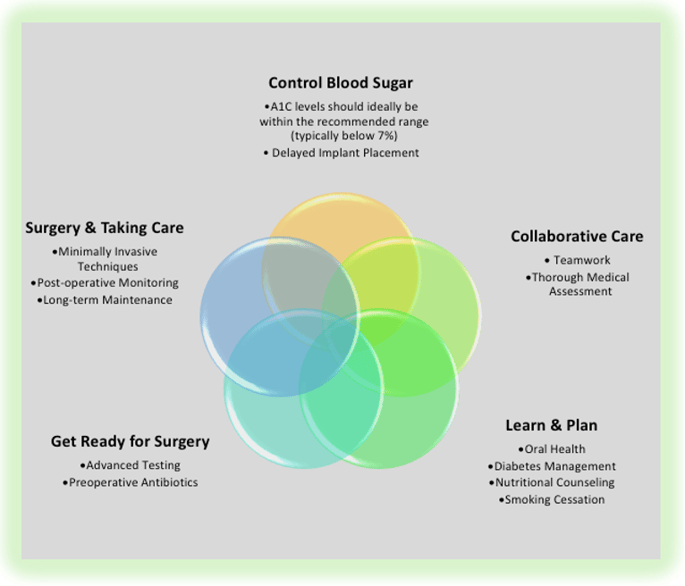Dental implants have changed how we restore missing or damaged teeth. But what if you have diabetes? Can you still get dental implants? The good news is, yes, you can, but there are a few things you need to be careful about. In this post, we'll look at how diabetes and dental implants are connected and consider the safety, complications, and cautions for people with diabetes.
Understanding Diabetes and Dental Health
Diabetes is a problem that happens when your body has trouble using insulin, which helps control the sugar in your blood. When your body doesn't use insulin properly, too much sugar stays in the bloodstream and can cause serious health issues, such as heart disease, vision loss, and kidney disease.
Diabetes can also affect your teeth and gums. People with diabetes often have a more challenging time healing from wounds, and their bodies might not fight infections as well. A weak immune system makes it easier to develop gum disease (periodontitis), which can cause tooth loss over time. These limitations in healing make it more difficult for people with diabetes to get dental implants.
Strategies to Improve Dental Implant Outcomes for Diabetics
Much research is examining the connection between diabetes and dental implants. According to a systematic review published in the Journal of Clinical Periodontology, the success rates for dental implants in well-controlled diabetic patients were equally as good as for people who don't have diabetes. In other words, as long as your diabetes is well controlled over time, dental implants can be a good treatment option to replace missing teeth.
5 primary strategies can make dental implants more successful for diabetic patients:

1. Control Blood Sugar: Before getting dental implants, controlling your blood sugar levels is essential. Your A1C levels should be within the recommended range (typically below 7%) so that you heal well after surgery. If your diabetes is poorly controlled, you might need to delay the procedure until your levels reach the targeted range.
2. Collaborative Care: Your dental implant specialist should contact your regular dentist, primary care physician, endocrinologist, and other relevant healthcare professionals. This teamwork ensures that your diabetes management is part of your dental implant plan, which helps minimize the risk of complications. Your dental implant specialist should also conduct a thorough medical exam to ensure nothing else is wrong before the dental implant surgery.
3. Learn and Plan: Before the dental implant surgery, you'll need to learn how to manage your oral health and maintain the correct A1C levels. Understanding how to do both can make a big difference in how successful your dental implants will be. You should also talk to a nutritional expert to know what foods promote healing after surgery. If you smoke, quitting before getting an implant is a good idea to increase the likelihood of success.
4. Get Ready for Surgery: Before the dental implant surgery, the dental implant specialist should use advanced techniques, such as cone-beam computed tomography (CBCT), to make sure you have enough bone for the implant. Enough bone density is critical for the implant to stay in place, both as it heals and over the long term. People with diabetes may have weaker bones, leading to implant problems. Also, because diabetic patients can get infections more easily, you may need antibiotics before the surgery to lower the risks.
5. Surgery and Taking Care: For people with diabetes, minimally invasive surgical techniques are used. These surgical techniques don't hurt the mouth as much, making it faster and easier to heal. Because you are at a higher risk of infection and delayed healing, you should schedule regular follow-up appointments with your dental implant specialist to ensure a complete recovery. It would be best if you also planned more regular dental check-ups on an ongoing basis to promptly address any new issues that may creep up and prevent any impact on your dental implants.
In conclusion, dental implants can be a safe and effective method to replace missing or damaged teeth for diabetic patients, as long as your diabetes is well controlled and you take good care of your oral health.
To find a dental implant expert near you, click below:
Written by Dr. Radhika Thakkar, BDS, MPH.
 Dr. Radhika Thakkar is a seasoned dental professional with over a decade of experience, transitioning from a dedicated student to a passionate educator. With a rich career journey that began in 2012 after earning her dental degree, she spent transformative years in Indian private practice before pursuing a Master's in Public Health from St. John's University, NY. Her thirst for knowledge led to a rigorous 2-year AEGD residency at the Eastman Institute of Oral Health, University of Rochester, NY. Dr. Thakkar's profound commitment to advancing dentistry and public health is evident through her extensive research portfolio of 20 internationally recognized scientific papers.
Dr. Radhika Thakkar is a seasoned dental professional with over a decade of experience, transitioning from a dedicated student to a passionate educator. With a rich career journey that began in 2012 after earning her dental degree, she spent transformative years in Indian private practice before pursuing a Master's in Public Health from St. John's University, NY. Her thirst for knowledge led to a rigorous 2-year AEGD residency at the Eastman Institute of Oral Health, University of Rochester, NY. Dr. Thakkar's profound commitment to advancing dentistry and public health is evident through her extensive research portfolio of 20 internationally recognized scientific papers.
Follow her Instagram @dr.radhika.thakkar for more information.






